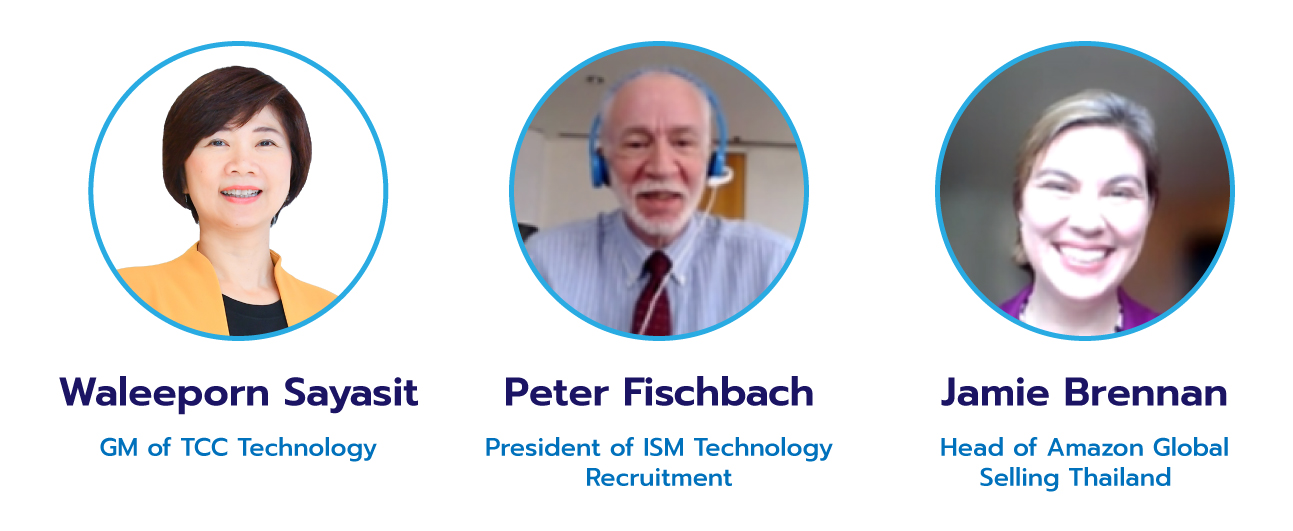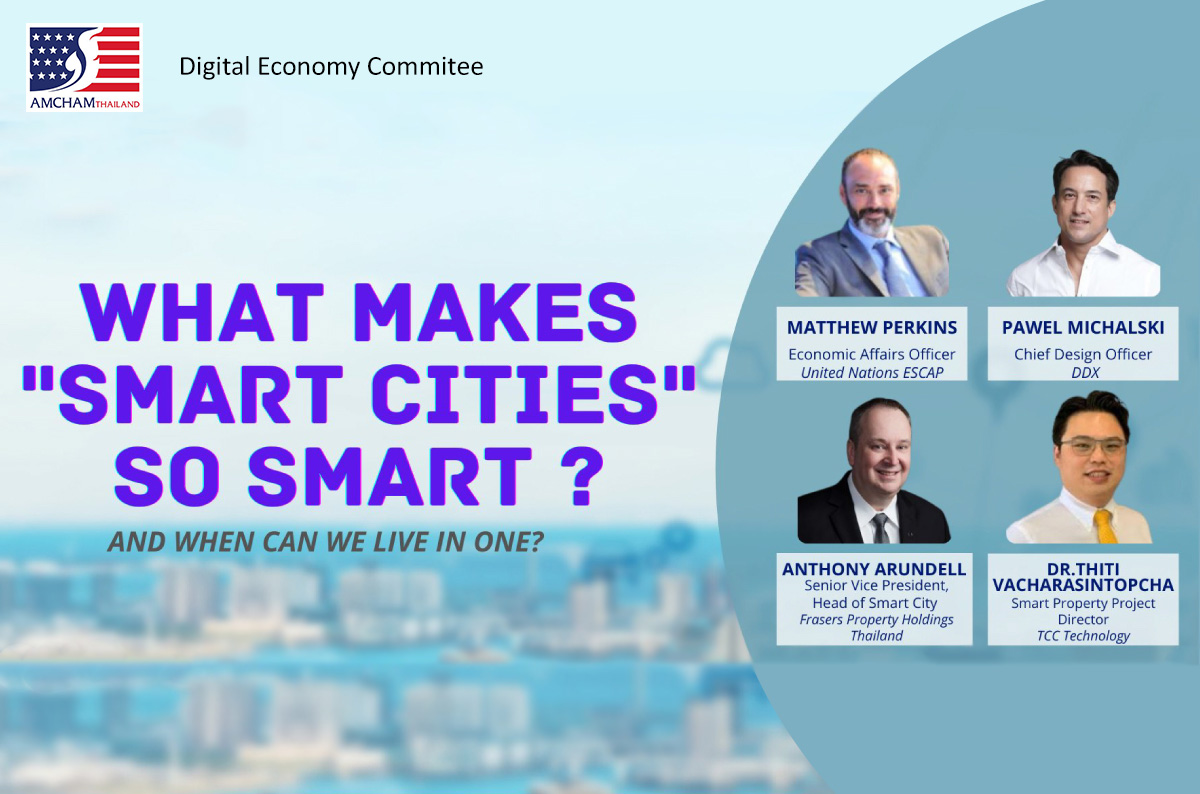By Waleeporn Sayasit, Peter Fischbach and Jamie Brennan
Highlights:
- We’ve all heard the phrase ‘Smart Cities’ but how do we separate the hype from the reality?
- Integrating cutting-edge technologies ‘from the ground up’ to create sustainable and service-oriented urban environments has the potential to be a game-changer for city dwellers’ quality of life.
- Green energy, healthcare, education, public safety – all can be reimagined through the application of digital technology, but how can we actually achieve these goals?
To answer these questions about Smart Cities (and to satisfy the curiosity of those who ask when and where they’ll be able to live in one), the Digital Economy Committee of the American Chamber of Commerce in Thailand (AMCHAM) recently convened a panel of world-class experts to discuss the current status of Smart City development.
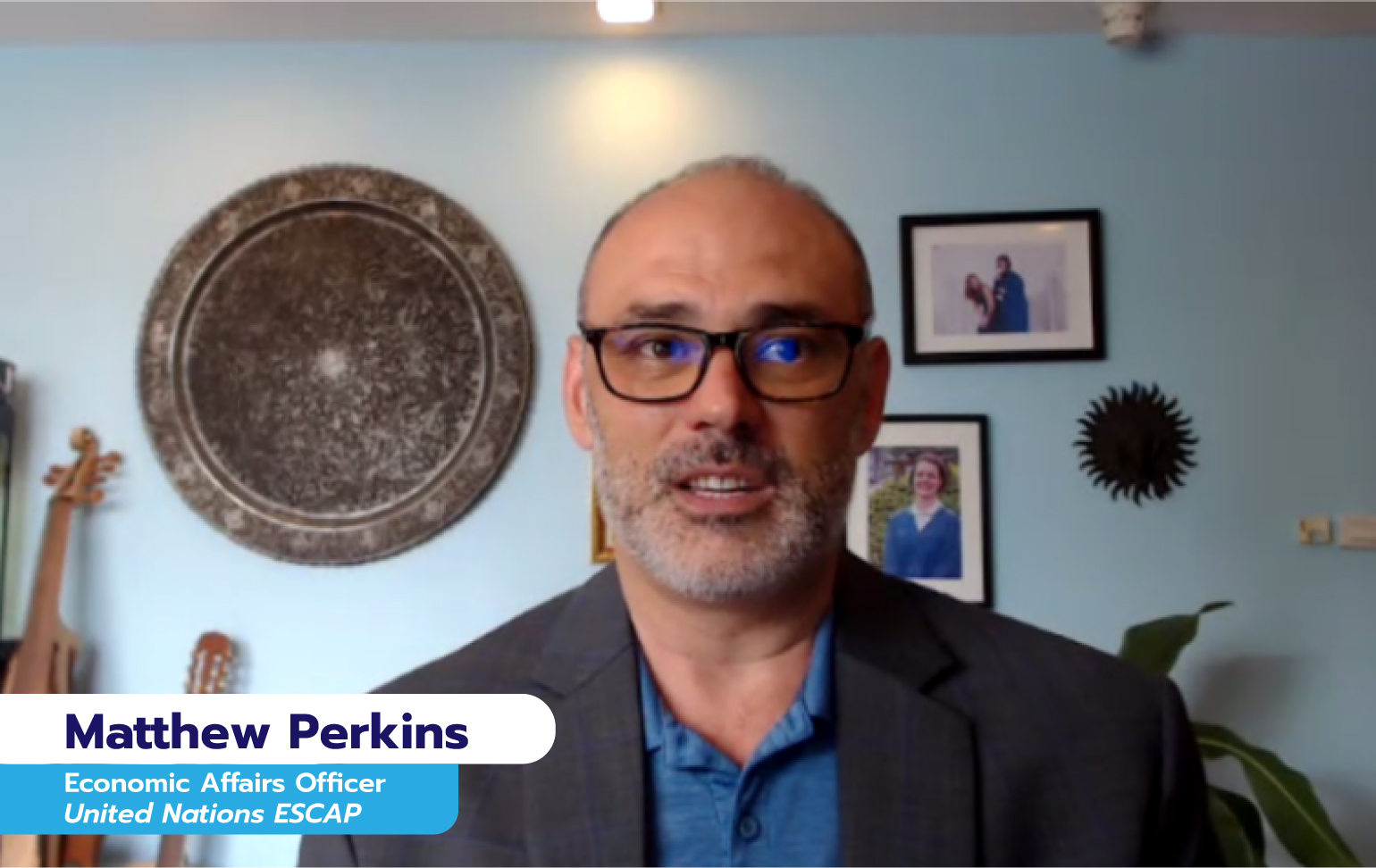 Matthew Perkins, Economic Affairs Officer from United Nations ESCAP, cited comparisons of several cities around the world, showing the challenges inherent in delivery of basic, underlying technology such as network bandwidth and raising the interesting question of whether your city is fast enough to be ‘smart’. Network performance (retransmission rate, throughput, latency, packet loss) is a fundamental consideration as it may impact the ability to deliver and use Smart City applications. Any rollout of Smart City concepts should avoid increasing the digital divide, and therefore investment in network infrastructure should be one of the basic requirements to create opportunities for all to benefit from Smart City development.
Matthew Perkins, Economic Affairs Officer from United Nations ESCAP, cited comparisons of several cities around the world, showing the challenges inherent in delivery of basic, underlying technology such as network bandwidth and raising the interesting question of whether your city is fast enough to be ‘smart’. Network performance (retransmission rate, throughput, latency, packet loss) is a fundamental consideration as it may impact the ability to deliver and use Smart City applications. Any rollout of Smart City concepts should avoid increasing the digital divide, and therefore investment in network infrastructure should be one of the basic requirements to create opportunities for all to benefit from Smart City development.
 Pawel Michalski, Chief Design Officer from DDX, focused on the question of how close we are to being able to live in a Smart City. He explained how the success of Smart Cities will depend on three, key criteria: being commercially viable, being people- centric, and being technically scalable. The services can involve Project Management, Building Information Modeling (BIM), integrated physical and digital User Experience, and the use of ‘Digital Twin’ environments to build and test these and other deliverables. Creating a Smart City has many challenges, such as the expectations of residential and commercial tenants for up-to-date interior designs that integrate new technology. Pawel discussed various ways to address these gaps. In his opinion, the future is here, it’s just unevenly distributed.
Pawel Michalski, Chief Design Officer from DDX, focused on the question of how close we are to being able to live in a Smart City. He explained how the success of Smart Cities will depend on three, key criteria: being commercially viable, being people- centric, and being technically scalable. The services can involve Project Management, Building Information Modeling (BIM), integrated physical and digital User Experience, and the use of ‘Digital Twin’ environments to build and test these and other deliverables. Creating a Smart City has many challenges, such as the expectations of residential and commercial tenants for up-to-date interior designs that integrate new technology. Pawel discussed various ways to address these gaps. In his opinion, the future is here, it’s just unevenly distributed.
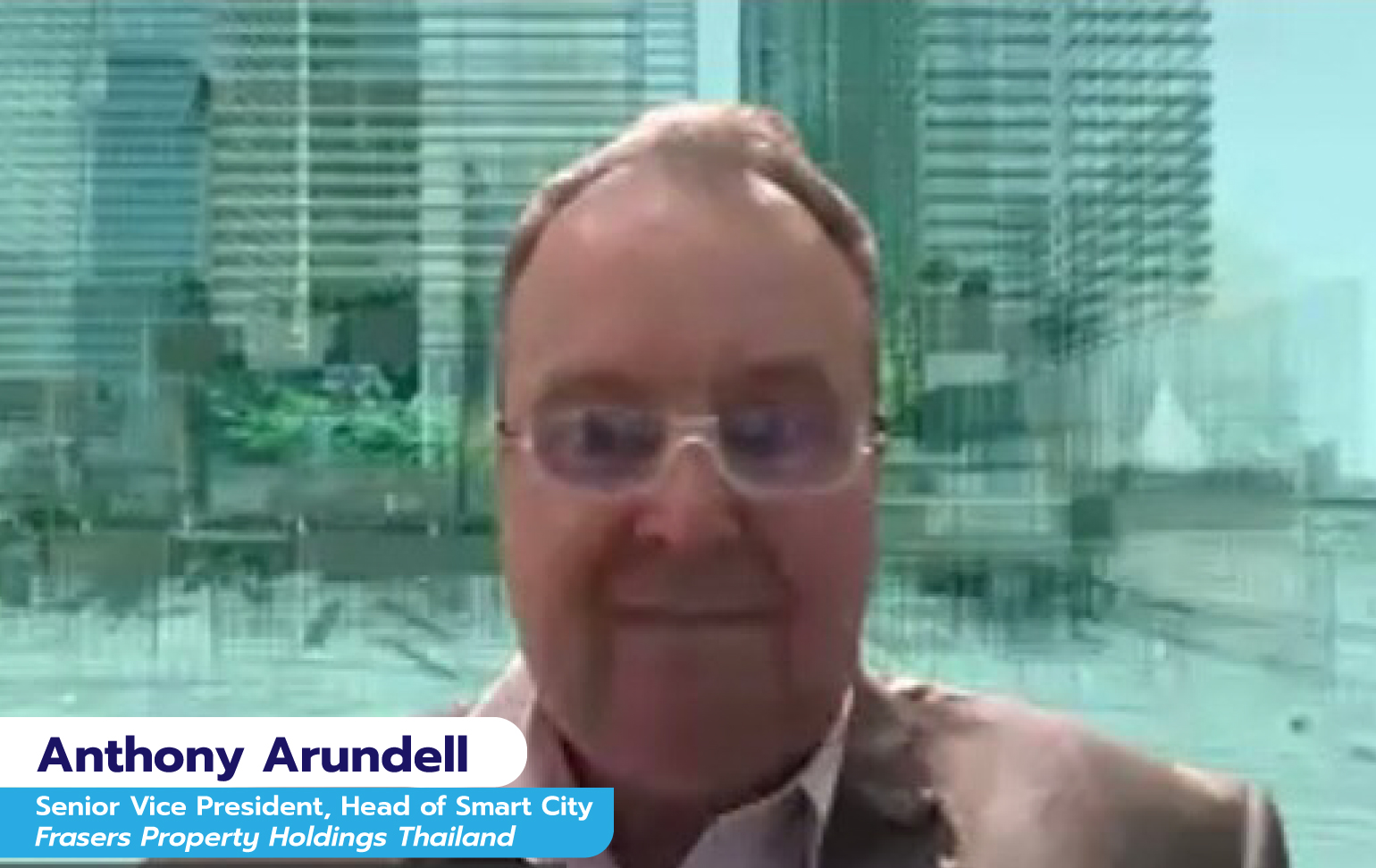 Anthony Arundell, Senior Vice President, Head of Smart City, Frasers Property Holdings Thailand, highlighted the case study of One Bangkok, the largest fully integrated real estate development in Bangkok’s central business district with gross floor area of 1.83 million square meters. The core values of One Bangkok focuses on people-centric principles, sustainability, and smart-city living to create a new way of urban living not yet seen in Bangkok and to deliver an extraordinary experience and set a new benchmark for Thailand enabled by services which create value for users of both the One Bangkok ecosystem and the wider community in which it exists. The underlying technology enables a premium customer experience, operational efficiency, and sustainability. The integrated Smart City solutions include wellness, smart energy, cybersecurity, data analytics, robotics and blockchain. Anthony believes a city cannot be smart without considering sustainable designs principles, and a city cannot optimize sustainable designs without considering smart technology.
Anthony Arundell, Senior Vice President, Head of Smart City, Frasers Property Holdings Thailand, highlighted the case study of One Bangkok, the largest fully integrated real estate development in Bangkok’s central business district with gross floor area of 1.83 million square meters. The core values of One Bangkok focuses on people-centric principles, sustainability, and smart-city living to create a new way of urban living not yet seen in Bangkok and to deliver an extraordinary experience and set a new benchmark for Thailand enabled by services which create value for users of both the One Bangkok ecosystem and the wider community in which it exists. The underlying technology enables a premium customer experience, operational efficiency, and sustainability. The integrated Smart City solutions include wellness, smart energy, cybersecurity, data analytics, robotics and blockchain. Anthony believes a city cannot be smart without considering sustainable designs principles, and a city cannot optimize sustainable designs without considering smart technology.
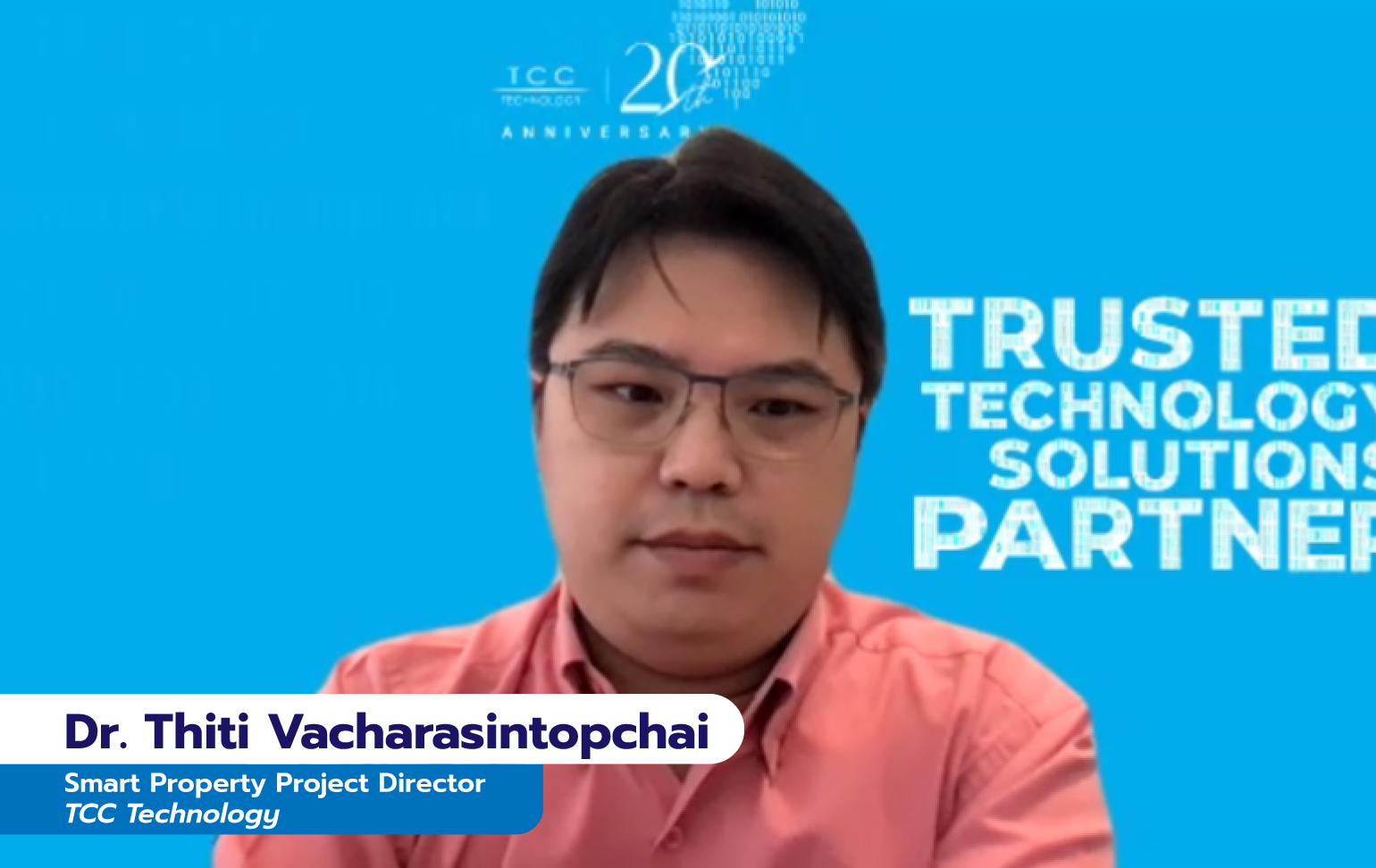 Dr. Thiti Vacharasintopchai – Smart Property Project Director, TCC Technology explained broadly about the opportunity for Smart Cities in Thailand. With his experience working with Thai government agencies and international partners, he shared that Smart Cities in Thailand are closely aligned with UN Sustainable Development Goals (UN-SDG) and the Bio, Circular, and Green (BCG) model. The Smart Cities concept was also addressed as part of Thailand’s 13th National Economic and Social Development Plan, which will be effective from next year. Thailand aims to make the transition from natural resource-based industries towards a knowledge-based or high value-added economy that is environmentally friendly. Dr. Thiti suggested that there is a lot of room for the application of advanced technologies in the Thailand Smart City context under seven key components: Smart Environment (which is a must), as well as Smart Energy, Smart Mobility, Smart Economy, Smart Governance, Smart People and Smart Living.
Dr. Thiti Vacharasintopchai – Smart Property Project Director, TCC Technology explained broadly about the opportunity for Smart Cities in Thailand. With his experience working with Thai government agencies and international partners, he shared that Smart Cities in Thailand are closely aligned with UN Sustainable Development Goals (UN-SDG) and the Bio, Circular, and Green (BCG) model. The Smart Cities concept was also addressed as part of Thailand’s 13th National Economic and Social Development Plan, which will be effective from next year. Thailand aims to make the transition from natural resource-based industries towards a knowledge-based or high value-added economy that is environmentally friendly. Dr. Thiti suggested that there is a lot of room for the application of advanced technologies in the Thailand Smart City context under seven key components: Smart Environment (which is a must), as well as Smart Energy, Smart Mobility, Smart Economy, Smart Governance, Smart People and Smart Living.
Some additional points raised during the Q&A which followed the presentations related to the importance of community inclusivity, the ways we can apply technology to drive training and education, and even some interesting discussion of how young, ‘smart rural’ farmers have been applying technology.
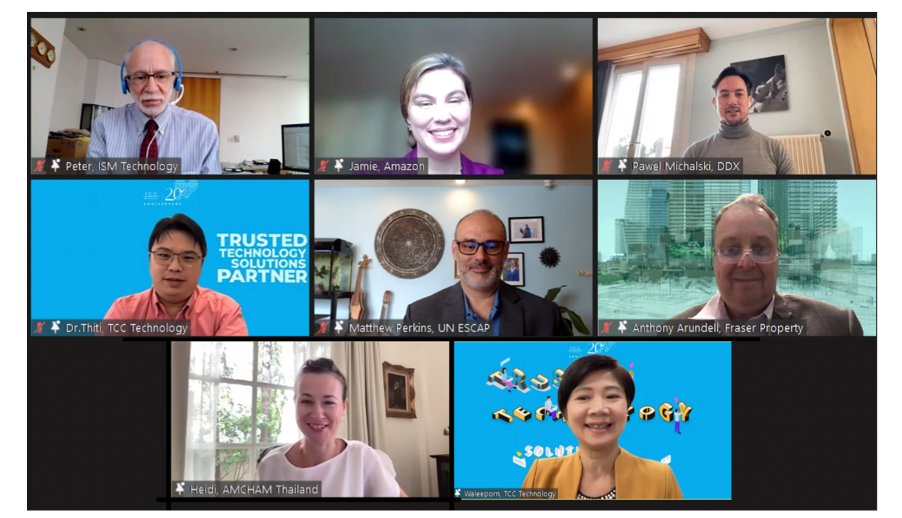
This is just a short summary – to hear all the details and learn what else our speakers shared you can watch the entire webinar here: https://www.youtube.com/watch?v=seMocl2zKyU
Authors:
Waleeporn Sayasit – GM of TCC Technology, Peter Fischbach – President of ISM Technology Recruitment, Jamie Brennan – Head of Amazon Global Selling Thailand
The three are co-chairs of the American Chamber of Commerce Digital Economy Committee.
The committee seeks to support the role of the digital economy in enabling universal participation in Thailand’s social and economic enterprise by all stakeholders.
